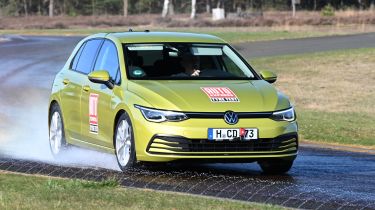Best all-season tyres 2026: top tyres tested and reviewed
We compare six all-season tyres to reveal the UK’s best year-round option
We rarely experience extended periods of snow here in the UK, so it’s no surprise that the all-season tyre is increasingly popular both here and in regions of Europe with similar climates.
In some European countries it’s compulsory to fit winter tyres, which are designed for the cold (7°C and lower), from late Autumn to Spring, changing to summer tyres for the warmer months. It’s not the case in the UK and very few drivers bother, which is why traffic often slithers to a halt in ice and snow.
The all-season tyre solves that problem. Just like winter tyres, all-season designs carry the same 3 Peak Mountain Snow Flake symbol on their sidewalls, showing they are capable in the snow. However, their construction, tread design and compound are developed to perform better than a winter tyre in warm conditions, so they can be used all year round, hence the name.
Of course, all-season tyres are a compromise. No single design can be brilliant in the wet, dry and snow, so we measured their performance in all conditions to reveal the balance each has struck. We also tested our winning winter and summer tyres at the same time to show their relative performance. And as usual, we have included a budget all-season tyre to see what you get for your money.
What we tested
We returned to the popular 225/45 R17 size for this test and our contenders included the reigning champion, the Pirelli Cinturato All Season SF 3, plus the joint runners-up from 2024, the Bridgestone Turanza All Season 6 and Continental AllSeason Contact 2. Completing the line-up were the Vredestein Quatrac and Dunlop All Season 2, and the budget tyre was the Sailun Atrezzo 4Seasons.
Used - available now

2026 FORD
RANGER
17,000 milesAutomaticDiesel2.0L
Cash £30,995
2023 Tesla
Model Y Premium
23,459 milesAutomaticElectric
Cash £24,300
2022 Mercedes
EQA
26,133 milesAutomaticElectric
Cash £18,300
2023 DS
DS 4
7,508 milesAutomaticPetrol1.2L
Cash £17,000As is our policy, all tyres were sourced from the open market to ensure that what we tested was what you can buy. Manufacturers nominated their tyres, three choosing a V speed rating (149mph) and two W (168mph), while our budget tyre was Y rated (183mph). All picked a weight rating of 94 and all but one nominated XL (extra load) spec.
EU label ratings are given (right) for fuel economy (RR – rolling resistance) and wet grip (WG), which range from A to E, with A being best. We also list pass-by noise (N), which is measured in decibels, so the lower the number the better.
| Tyre | Load | Speed | Economy / Rolling Resistance (RR) | Wet grip (WG) | Noise (N - decibels) |
| Bridgestone Turanza All Season 6 | 94 | V | C | B | 70 |
| Continental AllSeasonContact 2 | 94 | V | C | B | 72 |
| Dunlop All Season 2 | 94 | W | C | B | 72 |
| Pirelli Cinturato All Season SF 3 | 94 | W | C | A | 71 |
| Sailun Atrezzo 4Seasons | 94 | Y | D | C | 72 |
| Vredestein Quatrac | 94 | V | C | B | 71 |
How we tested the tyres
Snow
Snow tests were carried out at Goodyear’s ‘Arctic Center’ facility in Saariselkä, in the north of Finland. Here, the conditions were just cold enough to deliver consistency for our snow laps, with track temperatures ranging from -7°C to -4°C.
Handling was assessed on a short but tricky 0.8km (0.5 mile) track that included a significant drop and rise, a couple of quick transitions that tested handling balance and lateral grip, and a number of tight corners that tested braking and traction. Separately, we assessed braking from 30-3mph and acceleration from 5-20mph, taking the average from a number of runs over two days.
Wet tests
As usual, the wet and dry tests were carried out at Continental’s Contidrom near Hannover in Germany. Its northerly location delivered the low temperatures we sought, with early starts yielding 4 deg C.
We measured the stopping distance of each tyre from 50mph to zero, their cornering ability on a 57.5m diameter circle, and their resistance to aquaplaning in deeper water when driving in both a straight line and on a curve.
The challenging 1.8km (1.1-mile) wet handling circuit revealed each tyre’s cornering grip, traction, handling balance and breakaway characteristics.
Dry tests
Dry braking distances were measured from 62mph to zero and we measured lap times on a one-mile section of the serpentine dry handling circuit, which showed each tyre’s grip, handling balance and transient composure. In-cabin noise was measured on three surfaces and the average calculated.
Fuel economy
We measured rolling resistance – the energy required to turn a loaded tyre – to industry standards. A four to five per cent change in rolling resistance is equialent to a one per cent change in fuel consumption.
Price
Prices were sourced from online retailer Blackcircles.com and are for a fitted tyre at the time of writing. For tyres not retailed by Blackcircles, an average of the price at other retailers was used. However, price plays only a small part in the overall result.
Calculating a winner
The results for each test category are converted into percentages, with the top tyre rated at 100 per cent and the rest scored relative to this.
In terms of the overall score, reflecting the conditions we face in the UK, 50 per cent is accounted for by the wet performance, 35 per cent by the dry and 10 per cent by snow, with the emphasis on handling and braking in the wet and snow disciplines. The final five per cent is shared between the other tests.






